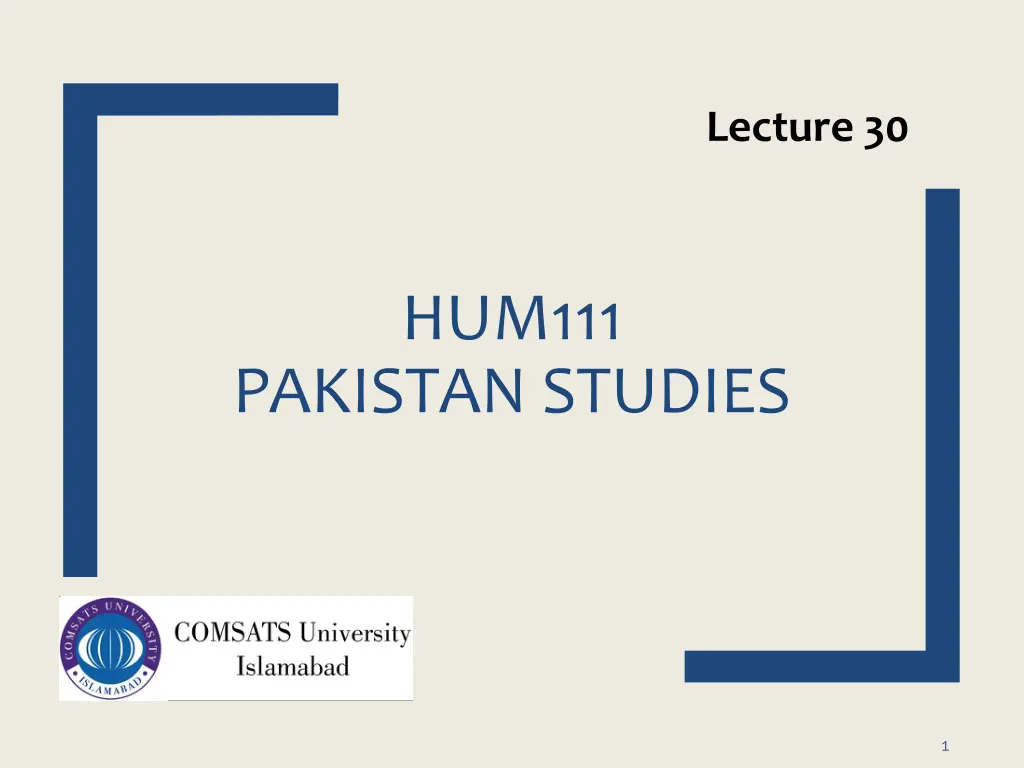
Pakistan's Role in the Global War on Terrorism
Pakistan played a pivotal role in the global war on terrorism by providing crucial support to the US, including overflight rights, access to bases, and intelligence sharing. Its geographical location made it a key ally in the fight against terrorism, especially in Afghanistan. The US relied on Pakistan to cut ties with terrorist organizations and assist in offensive military operations.
Download Presentation

Please find below an Image/Link to download the presentation.
The content on the website is provided AS IS for your information and personal use only. It may not be sold, licensed, or shared on other websites without obtaining consent from the author. If you encounter any issues during the download, it is possible that the publisher has removed the file from their server.
You are allowed to download the files provided on this website for personal or commercial use, subject to the condition that they are used lawfully. All files are the property of their respective owners.
The content on the website is provided AS IS for your information and personal use only. It may not be sold, licensed, or shared on other websites without obtaining consent from the author.
E N D
Presentation Transcript
Lecture 30 HUM111 PAKISTAN STUDIES 1
HUM 111 PAKISTAN STUDIES The Role of Pakistan in the War Against The Role of Pakistan in the War Against Terrorism (B) Terrorism (B) Dr. Sohail Ahmad 2
War Against Terrorism Global War on Terror and Pakistan s Position Due to its geographical location and its links to major regional players like India, Iran, Afghanistan and China, the US needed Pakistan s support. Pakistan provided different types of support demanded by the US such as, over flight rights, access to Pakistani air, naval and land bases, crush the domestic elements who are in support of terrorism against Americans and its allies, end every logistic and diplomatic support to Taliban Ended diplomatic ties with the Taliban in Afghanistan 3
War Against Terrorism Global War on Terror and Pakistan s Position The whole world was now looking towards Pakistan and without its help it was unlikely the US would have been able to pursue its interests in the region. Pakistan s role in the War against Terrorism is Pivotal. The US preferred Pakistan s cooperation over India s due to two reasons: one was Pakistan s geographic proximity to Afghanistan and the second was that the Indian army was equipped with Russian weapons and training. Pakistan not only has a long border with Afghanistan but it has a long coastline which was very important for US forces and they stationed in the Indian Ocean because it wanted its forces to reach Afghanistan quickly and easily 4
War Against Terrorism Global War on Terror and Pakistan s Position Due to diplomatic relations between Pakistan and the Taliban the US had been keen to get its support in the war against al Qaeda and its networks in Afghanistan. This relationship of Pakistan and the Taliban regime was very significant in pursuing US military and political interest in the region. The Taliban regime was basically run by the Pashtun, an ethnic group of Afghanistan, who have the same culture and traditions as the Pashtun s of the Khyber Pakhtunkhwa and Balochistan in Pakistan. 5
War Against Terrorism Global War on Terror and Pakistan s Position Pakistan was the most useful ally. The US demanded that Pakistan cut itself off completely from al Qaeda activity and break their diplomatic ties with the Taliban, freezing all their assets, stopping fuel supplies, provide the US with intelligence information about both organizations and allow it to use its airspace for offensive military operations in Afghanistan and bases for US forces in Pakistan, logistics, and the like. 6
War Against Terrorism Steps by Pakistan after 9/11 Supported all UN resolutions regarding prevention of terrorism Cooperation with the international coalition to curb terrorism. Immigration control measures to keep a check on the movement ofpotential extremists. Action against fanatical and extremist organizations and groups. Detention of Jihadi leaders. Banning Jihadi organizations. 7
War Against Terrorism Steps by Pakistan (Contd..) Reformation and regulation of madrassahs encompassing: (a) NOC (No Objection Certificate) for the opening of madrassahs. (b) The registration of madrassahs. (c) A review of their syllabi. (d) A curb on the number of foreign students attending them. Regulation of Mosques: (a) NOC required for opening a mosque. (b) Political activities in mosques made unlawful. (c) The use of loudspeakers restricted to the Azaan (the call to prayer). 8
War Against Terrorism Steps by Pakistan (Contd..) Provision of Air Bases It allowed the US and its coalition forces to use its air bases/airfields in Pasni, Jacobabad, Shamsi and Dalbadin. It also permitted the US to land planes anywhere in Pakistan in the case of an emergency and access to Kohat and Zhob air bases was also provided. 9
War Against Terrorism Steps by Pakistan (Contd..) Support of an Air Corridor Pakistan provided an air corridor for the use of the US and its coalition forces in launching air strikes on Afghanistan because it would have been difficult for the US to keep launching ground operations into Afghanistan. In providing such a resource Pakistan s government had to reschedule/redirect many commercial flights; 2/3rd of Pakistan airspace was provided to US forces for OEF operations and about seven thousand air force personnel were allocated to the role. 10
War Against Terrorism Steps by Pakistan (Contd..) Support of Naval Facilities Support in landing ships at Pasni and even curtailed its Navel training operations in order to accommodate the US and Coalition Navies. Around 25000 Pakistan Navy personnel, 50 aircraft and 2,000 Coalition military personnel were imbedded in these locations, using up to 100,000 gallons of fuel a day. The US Amphibious task force (TF 58) was involved for a hundred days of surface operations and landed 275 craft for offloading. US 400 C-17 and C-130 helicopters were used in various sorties, about 8000 Marines, 330 vehicles and 1350 tons of cargo were regularly used throughout the operation. An officer from Florida stated these efforts may be the largest amphibious operation conducted by the US Marine Corp since the Korean War. 11
War Against Terrorism Steps by Pakistan (Contd..) Support for Logistic Supply by Road Pakistan allowed the US and NATO to use Pakistani supply routes for about 75 per cent of its gas, food and military equipment requirements. This supply route made a significant contribution to the success of operations in Afghanistan, but many were destroyed or damaged by tribal militants. 12
War Against Terrorism Steps by Pakistan (Contd..) Sharing Intelligence Information Pakistan provided the US with vital information on various terrorist and extremist outfits helping avert terrorist attacks and facilitating arrests that broke the back bone of major terrorist organizations. In August 2006 Pakistan shared its intelligence information with the UK and played a pivotal role in attack prevention, allowing them to take pre-emptive action against terrorists planning to use chemical explosives on a civil airplane. 13






















